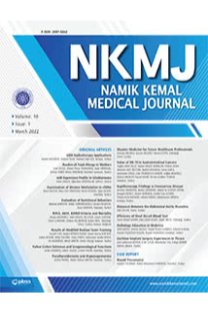Lökosit Trombosit Agregatlarının İleri Evre Kanser Hastalarında Tromboz Gelişimine Katkısı
Lökosit trombosit agregatı, tromboz, tümor
Contribution of Leukocyte Platelet Aggregates to Development of Thrombosis in Patients With Advanced Cancer
Leukocyte platelet aggregate, thrombosis, tumour,
___
- Naess IA, Christiansen SC, Romundstad P, Cannegieter SC, Rosendaal FR, Hammerstrom J. Incidence and mortality of venous thrombosis: a population-based study. J Thromb Haemost. 2007 Apr;5(4):692-9.
- 2. Spencer FA, Lessard D, Emery C, Reed G, Goldberg RJ. Venous thromboembolism in the outpatient setting. Arch Intern Med. 2007 Jul 23;167(14):1471-5.
- 3. Cronin-Fenton DP, Søndergaard F, Pedersen LA, Fryzek JP, Cetin K, Acquavella J, Baron JA, Sørensen HT. Hospitalisation for venous thromboembolism in cancer patients and the general population: a population-based cohort study in Denmark, 1997-2006. Br J Cancer. Sep 28;103(7):947-53.
- 4. Heit JA, Silverstein MD, Mohr DN, Petterson TM, O'Fallon WM, Melton LJ, 3rd. Risk factors for deep vein thrombosis and pulmonary embolism: a population-based case-control study. Arch Intern Med. 2000 Mar 27;160(6):809-15.
- 5. Ley K. The role of selectins in inflammation and disease. Trends Mol Med 2003;9(6):263-258
- 6. Huo Y, Ley K. Adhesion molecules and atherogenesis. Acta Physiol Scand. 2001;173(1):35-43.
- 7. Huo Y, Ley KF. Role of platelets in the development of atherosclerosis. Trends Cardiovasc Med 2004;14(1):18-22.
- 8. Levitan N, Dowlati A, Remick SC, Tahsildar HI, Sivinski LD, Beyth R, Rimm AA. Rates of initial and recurrent thromboembolic disease among patients with malignancy versus those without malignancy; risk analysis using Medicare claims data. Medicine.(Baltimore) 1999;78:285-291
- 9. Siegfried JM. Biology and chemoprevention of lung cancer. Chest 1999;113 Supp l:40-5.
- 10. Turgut B, Turgut N, Celik Y, Tekgündüz E, Pamuk GE, Demir MDifferences in platelet–leukocyte aggregates among subtypes of acute cerebral ischemia. Journal of the Neurological Sciences 305 (2011) 126–130
- 11. Timp JF, Braekkan SK, Versteeg HH, Cannegieter SC. Epidemiology of cancer-associated venous thrombosis. September 5, 2013; Blood: 122 (10)
- ISSN: 2587-0262
- Yayın Aralığı: 4
- Başlangıç: 2013
- Yayıncı: Galenos Yayınevi
Birol TOPÇU, Zerrin Deniz AYDOĞDU
Kist Hidatik ve Tümör Tanısal Ayrımında Yaşanan İkilem, İki Olgu Nedeniyle
Fazlı YANIK, Yekta Altemur KARAMUSTAFAOĞLU, Yener YÖRÜK
Lökosit Trombosit Agregatlarının İleri Evre Kanser Hastalarında Tromboz Gelişimine Katkısı
Tarkan YETİŞYİĞİT, Burcu AVCI, Okan AVCI, Dilek SOLMAZ, Burhan TURGUT
Obez Çocuklarda Depresyon ve Eser Elementler İlişkisi
Mustafa Metin DONMA, Orkide DONMA
Duygu BAYIR, Tarkan YETİŞYİĞİT
Acil Servise Travma Nedeniyle Başvuran Çocukların Cinsiyet Farklılığı Açısından Değerlendirilmesi
Mustafa Metin DONMA, İsmail TAYFUR, Mustafa Numan ERDEM, Muhammet DEMİRKOL, Birol TOPÇU, Orkide DONMA
Hemşirelik Öğrencilerinin İş Sağlığı ve Güvenliği Hakkında Farkındalık Düzeylerinin Arttırılması
